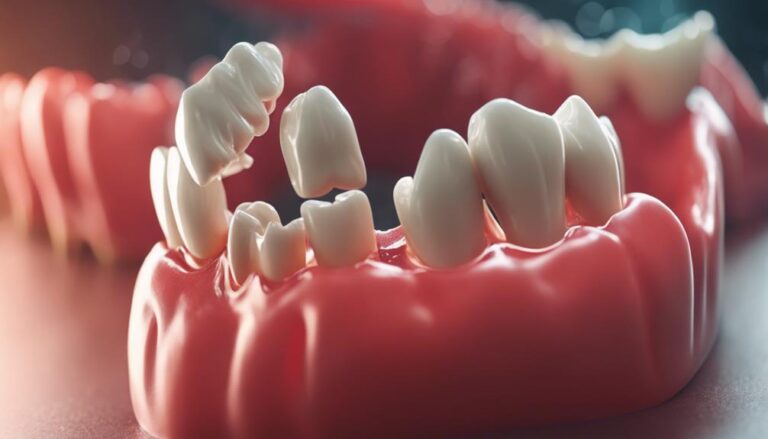Addressing halitosis and gum disease signals an oral imbalance needing prompt attention. To begin with, prioritize regular tongue cleaning to reduce harmful bacteria in the mouth. Next, opt for an antiseptic mouthwash that targets bacteria causing bad breath. Finally, maintain a consistent oral hygiene routine including brushing, flossing, and professional dental check-ups. These three tips are essential for combating halitosis and gum disease, linking oral health to overall well-being. Additional insights await for further enhancement of oral care practices.
Key Takeaways
- Maintain proper oral hygiene to prevent halitosis and gum disease.
- Use antiseptic mouthwash to target odor-causing bacteria.
- Regularly clean your tongue to reduce bacterial load in the mouth.
- Visit a dentist for professional cleanings and early detection of gum issues.
- Be mindful of dietary choices to support oral health and fresh breath.
Understanding Halitosis and Gum Disease
Understanding the connection between halitosis and gum disease is crucial for maintaining oral health. Halitosis, commonly known as bad breath, can be a sign of an imbalance in the oral microbiome, the community of microorganisms living in the mouth. Gum disease, on the other hand, is often caused by the buildup of plaque and bacteria along the gumline, leading to inflammation and potential tooth loss if left untreated.
One essential aspect to take into account in combating halitosis and preventing gum disease is tongue cleaning. The tongue harbors a significant amount of bacteria that can contribute to bad breath and oral health issues. Regularly cleaning the tongue with a tongue scraper or a toothbrush can help reduce the bacterial load in the mouth, thereby decreasing the likelihood of developing halitosis and gum problems.
Causes of Bad Breath and Gum Issues
Exploring the underlying causes of bad breath and gum issues reveals a complex interplay of factors related to oral hygiene and bacterial activity in the mouth. Dietary changes play a significant role in oral health. Foods high in sugar or acids can contribute to the growth of bacteria that cause bad breath and gum problems. Additionally, a lack of essential nutrients, such as vitamin C, can weaken the gums, making them more susceptible to disease.
Lifestyle habits also impact the health of your mouth. Smoking not only stains teeth but also reduces blood flow to the gums, affecting their ability to fight off infections. Poor oral hygiene practices, like irregular brushing and flossing, allow plaque to build up, leading to gum inflammation and bad breath. Stress can also play a role as it weakens the immune system, making it harder for the body to combat oral infections.
Understanding how dietary changes and lifestyle habits can influence bad breath and gum issues is vital in maintaining excellent oral health. By making conscious choices in these areas, you can help prevent and manage these common problems effectively.
Importance of Oral Hygiene
Maintaining proper oral hygiene is essential in preventing the development of halitosis and gum disease. As a dental professional, I emphasize the importance of consistent oral care practices to guarantee excellent oral health.
Here are three essential tips to enhance your oral hygiene routine:
- Mouthwash Benefits and Techniques: Including mouthwash in your daily routine can help kill bacteria in areas where brushing and flossing might miss. Look for mouthwashes that contain antibacterial properties to combat bad breath and reduce plaque buildup. Remember to swish the mouthwash around for at least 30 seconds to ensure complete coverage.
- Tongue Scraping Benefits: Many individuals overlook the significance of cleaning their tongue. Using a tongue scraper can effectively remove bacteria, food debris, and dead cells that contribute to bad breath. Gently scrape your tongue from back to front to eliminate the root cause of halitosis.
- Regular Dental Check-ups: Scheduling routine dental visits is vital for maintaining good oral health. Professional cleanings and examinations can detect early signs of gum disease and provide personalized recommendations for your oral hygiene routine.
Impact of Bacteria on Breath
The presence of bacteria in the mouth greatly influences the freshness of one’s breath. Bacterial imbalance within the oral microbiome can lead to halitosis, commonly known as bad breath. Understanding the intricate oral microbiome-breath relation is essential in maintaining oral health and fresh breath.
To illustrate this point, consider the following table:
| Types of Bacteria | Effects on Breath | Ways to Maintain Balance |
|---|---|---|
| *Streptococcus mutans* | Can contribute to bad breath | Regular brushing and flossing |
| *Porphyromonas gingivalis* | Associated with gum disease | Proper dental cleanings |
| *Fusobacterium nucleatum* | Can produce foul-smelling gases | Using antibacterial mouthwash |
Role of Plaque in Halitosis
Plaque buildup in the mouth plays a substantial role in the development of halitosis, commonly known as bad breath. As a dental professional, I’ve seen firsthand how plaque can contribute to this unpleasant condition.
Here are three key ways in which plaque impacts halitosis:
- Plaque buildup: When plaque, a sticky film containing bacteria, accumulates on teeth and along the gumline, it provides the perfect environment for oral bacteria to thrive. These bacteria release foul-smelling gases that can result in bad breath.
- Oral bacteria: The bacteria present in plaque feed on leftover food particles in the mouth, producing volatile sulfur compounds as a byproduct. These compounds have a strong odor resembling rotten eggs, contributing significantly to halitosis.
- Growth of bacteria: Without proper oral hygiene practices such as regular brushing and flossing, plaque can harden into tartar, providing a breeding ground for even more bacteria. This bacterial overgrowth intensifies the odor and exacerbates bad breath.
Signs of Gum Disease and Bad Breath
Early detection of gum disease is essential in identifying potential causes of bad breath and taking appropriate preventive measures. Maintaining good oral hygiene is key in preventing gum disease, which is often characterized by symptoms such as inflamed gums, bleeding while brushing or flossing, persistent bad breath, receding gums, and loose teeth. These signs indicate possible underlying issues that need to be addressed promptly to avoid further complications.
Regular visits to the dentist for check-ups and professional cleanings play a significant role in monitoring dental health and catching gum disease in its early stages. Practicing proper oral hygiene at home, including brushing twice a day, flossing daily, and using mouthwash, can help prevent the buildup of plaque and bacteria that lead to gum disease and bad breath.
Understanding the connection between gum health and breath is crucial for maintaining overall dental health. By staying vigilant and proactive in caring for your teeth and gums, you can reduce the risk of gum disease and its associated symptoms, including halitosis.
Connection Between Gum Health and Breath
Maintaining excellent gum health is essential for combating halitosis and ensuring fresh breath. The condition of your gums plays a significant role in the overall health of your mouth and can directly impact the freshness of your breath. Here are three key points to keep in mind regarding the connection between gum health and breath:
- Breath Fresheners: While breath fresheners like mints or gum can temporarily mask bad breath, addressing the root cause, such as poor gum health, is vital for long-term fresh breath.
- Halitosis Myths: There are myths surrounding halitosis, with many attributing bad breath solely to poor oral hygiene. However, gum health and underlying periodontal issues can also contribute to persistent bad breath.
- Periodontal Connection: Periodontal disease, a severe form of gum disease, can lead to persistent bad breath due to the buildup of bacteria and plaque in the pockets between the teeth and gums. Maintaining good gum health through proper oral hygiene practices is essential for combating halitosis and promoting fresh breath.
Prevention Techniques for Halitosis
To combat halitosis effectively, implementing preventive techniques is essential in maintaining fresh breath and overall oral health. When it comes to preventing bad breath, there are several key strategies to take into account. Initially, the effectiveness of mouthwash can play a significant role in controlling halitosis. Choosing an antiseptic mouthwash that targets odor-causing bacteria can be beneficial. Additionally, being mindful of dietary impacts is important. Foods like garlic and onions can contribute to bad breath, so moderating their consumption can help.
Moreover, lifestyle habits such as regular brushing and flossing are fundamental in preventing halitosis. Practicing good oral hygiene removes food particles and bacteria that can lead to foul odors. Finally, considering holistic approaches like tongue scraping and staying hydrated can also aid in keeping breath fresh. By incorporating these preventive techniques into your daily routine, you can effectively combat halitosis and maintain excellent oral health.
| Preventive Techniques | Description |
|---|---|
| Mouthwash Effectiveness | Choose an antiseptic mouthwash to target odor-causing bacteria. |
| Dietary Impacts | Be mindful of foods like garlic and onions that can contribute to bad breath. |
| Lifestyle Habits | Maintain regular brushing, flossing, and good oral hygiene practices. |
| Holistic Approaches | Consider tongue scraping and staying hydrated to aid in keeping breath fresh. |
Treatment Options for Gum Disease
Treatment options for gum disease typically involve professional dental interventions and diligent at-home care. When addressing gum disease, it’s essential to explore various approaches to manage and treat the condition effectively. Here are three key strategies to combat gum disease:
- Professional Dental Treatments: Seeking professional help from a dentist or periodontist is vital for managing gum disease. Treatments may include deep cleaning procedures like scaling and root planing, antibiotic therapy, or in severe cases, surgical interventions to restore gum health.
- Natural Remedies: Incorporating natural remedies such as saltwater rinses, tea tree oil, or aloe vera gel can help reduce inflammation and promote healing in the gums. These remedies can be used in conjunction with professional treatments for added benefit.
- Lifestyle Changes: Adopting a good oral hygiene routine, including regular brushing, flossing, and using an antiseptic mouthwash, is essential in managing gum disease. Additionally, lifestyle adjustments such as quitting smoking, reducing stress, and maintaining a balanced diet can have a significant impact on gum health positively.
Diets Influence on Oral Odor
Exploring the impact of dietary choices on oral odor provides valuable insights into overall oral health maintenance and hygiene practices. Dietary habits play a significant role in influencing oral odor, commonly known as halitosis. Nutrition plays an important part in not only maintaining fresh breath but also supporting gum health and preventing gum disease.
Certain foods, such as garlic and onions, can contribute to bad breath due to their strong odors. These odors can linger in the mouth even after brushing and flossing. On the other hand, a diet rich in fruits and vegetables can help combat bad breath by promoting saliva production, which naturally cleanses the mouth.
It is essential to pay attention to what we eat and how it affects our oral health. Making mindful dietary choices can go a long way in preventing halitosis and maintaining overall oral hygiene. By incorporating nutritious foods and staying hydrated, we can support fresh breath and healthy gums.
Proper Brushing and Flossing Methods
Proper maintenance of oral hygiene through effective brushing and flossing techniques is crucial for preventing gum disease and maintaining fresh breath. To guarantee excellent gum health and fresh breath, follow these key tips:
- Brushing Techniques for Gum Health: Use a soft-bristled toothbrush and gentle, circular motions to clean all tooth surfaces, including along the gumline. Angle the brush at 45 degrees towards the gums to help remove plaque and debris effectively.
- Flossing Tips for Fresh Breath: Floss at least once a day to remove food particles and plaque from between teeth where your toothbrush can’t reach. Hold the floss in a C-shape around each tooth and glide it up and down to clean the sides thoroughly.
- Rinse after Flossing: After flossing, rinse your mouth with an antimicrobial mouthwash to help kill bacteria that cause bad breath and gum disease. Choose a mouthwash with fluoride to strengthen teeth and prevent decay.
Regular Dental Check-ups Importance
Routine dental check-ups play an essential role in maintaining excellent oral health and preventing potential issues such as gum disease and halitosis. As a dentist, I can’t stress enough the significance of regular dental visits for maintaining top-notch dental hygiene. These check-ups aren’t just about cleaning your teeth; they’re a cornerstone of preventive care in dentistry.
During these appointments, your dentist can assess your overall oral health, identify any early signs of gum disease, and provide professional cleaning that goes beyond what you can achieve at home. Even with excellent brushing and flossing habits, plaque and tartar can build up over time, leading to gum inflammation and potential bad breath.
Moreover, through regular dental visits, your dentist can catch any issues before they escalate into more significant problems, saving you time, money, and discomfort in the long run. Remember, prevention is key in dentistry, and routine dental check-ups are an indispensable component of maintaining a healthy smile.
Managing Chronic Bad Breath
Addressing persistent bad breath, also known as halitosis, requires a thorough approach that targets its underlying causes. When managing chronic bad breath, consider the following strategies:
- Integrate Oral Probiotics: Incorporating oral probiotics into your daily routine can help promote a healthy balance of bacteria in your mouth, leading to fresher breath. These beneficial bacteria can help combat the odor-causing microbes that contribute to halitosis.
- Evaluate Lifestyle Habits: Take a closer look at your lifestyle habits to identify potential triggers for mouth odor. Factors such as smoking, poor oral hygiene, certain foods, and dehydration can all play a role in causing bad breath. Making positive changes, such as quitting smoking, staying hydrated, and maintaining a consistent oral care routine, can greatly improve the freshness of your breath.
- Seek Professional Guidance: If chronic bad breath persists despite your efforts, it may be beneficial to consult with a dental professional. They can provide personalized recommendations and treatments to address underlying issues contributing to halitosis, ensuring long-term oral health and fresh breath.
Professional Help for Gum and Breath
Seeking professional assistance for gum health and breath concerns can provide valuable insights and tailored treatment options to address underlying issues effectively. When dealing with persistent bad breath or gum disease, it’s essential to consult with a dental professional.
Breath fresheners may offer temporary relief, but they don’t address the root cause of the problem. A dentist can conduct a thorough examination to determine the source of halitosis and develop a personalized treatment plan.
Professional help may involve oral health treatments such as deep cleanings to remove plaque and tartar buildup that contribute to gum disease and bad breath. Additionally, if gum disease is present, the dentist may recommend periodontal therapy to restore gum health. These interventions are important for preventing the progression of gum disease and improving breath odor in the long run.
Maintaining Long-Term Oral Health
To maintain excellent oral health in the long term, consistent adherence to proper oral hygiene practices is essential. Here are three key aspects to focus on for maintaining long-term oral health:
- Dietary habits: A balanced diet rich in vitamins, minerals, and nutrients is vital for overall oral health. Limiting sugary and acidic foods can help prevent tooth decay and gum disease. Additionally, staying hydrated by drinking plenty of water can promote saliva production, which aids in protecting the teeth and gums.
- Effective oral hygiene routine: Brushing teeth at least twice a day with fluoride toothpaste, flossing daily, and using mouthwash can help remove plaque and bacteria that can lead to gum disease and bad breath. Regular dental check-ups and professional cleanings are also essential for maintaining excellent oral health.
- Lifestyle changes: Avoiding tobacco products, managing stress, and incorporating regular exercise into your routine can positively impact your oral health. Smoking and high stress levels can contribute to gum disease, while exercise can boost overall immune function, including oral health. Making these lifestyle changes can help support long-term oral health and prevent gum disease.
Frequently Asked Questions
Can Medications Cause Chronic Bad Breath and Gum Issues?
Medications can contribute to chronic bad breath and gum issues. Monitoring diet impact and maintaining excellent dental hygiene are crucial. Proper care and regular dental check-ups can help manage these concerns effectively.
Are There Natural Remedies to Combat Halitosis and Gum Disease?
Natural remedies like oil pulling, herbal mouthwashes, and probiotics can aid in fighting halitosis and preventing gum disease. Regular brushing, flossing, and dental visits are crucial prevention techniques to maintain oral health.
How Does Stress Affect Oral Health and Bad Breath?
Stress management plays an essential role in oral health. Prioritizing stress reduction alongside proper oral hygiene techniques can help combat bad breath. Calm mind, good oral care, key to fresh breath and healthy gums.
Can Genetics Play a Role in Developing Gum Disease and Bad Breath?
Genetic predisposition can indeed play a significant role in the development of gum disease and halitosis. Understanding family history and maintaining good oral hygiene are essential in managing these conditions effectively.
Is There a Connection Between Hormonal Changes and Halitosis?
Hormonal fluctuations can impact oral health, leading to chronic bad breath. Understanding how hormonal changes affect oral bacteria can help manage halitosis. Consistent dental care and monitoring of hormonal shifts are essential for oral health.
Conclusion
To sum up, maintaining good oral hygiene is essential in preventing both halitosis and gum disease.
By brushing and flossing regularly, attending routine dental check-ups, and seeking professional help when needed, you can keep your breath fresh and your gums healthy.
Remember, a little effort now can save you from a lot of trouble later on.
So, take care of your oral health to enjoy a confident smile and fresh breath every day.






